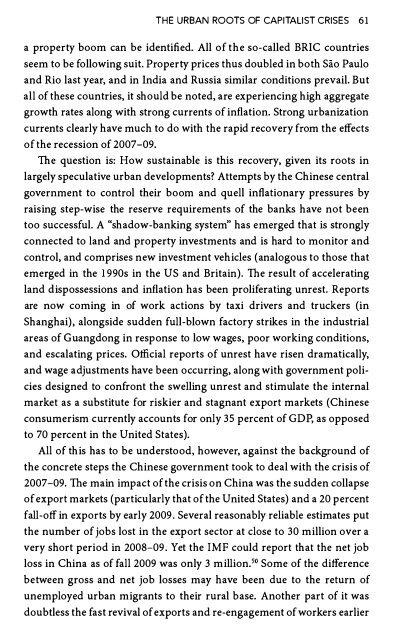Rebel Cities-David Harvey
Rebel Cities-David Harvey
Rebel Cities-David Harvey
- No tags were found...
Create successful ePaper yourself
Turn your PDF publications into a flip-book with our unique Google optimized e-Paper software.
THE URBAN ROOTS OF CAPITALIST CRISES 61a property boom can be identified. All of the so-called BRIC countriesseem to be following suit. Property prices thus doubled in both Sao Pauloand Rio last year, and in India and Russia similar conditions prevail. Butall of these countries, it should be noted, are experiencing high aggregategrowth rates along with strong currents of inflation. Strong urbanizationcurrents clearly have much to do with the rapid recovery from the effectsof the recession of 2007-09.The question is: How sustainable is this recovery, given its roots inlargely speculative urban developments? Attempts by the Chinese centralgovernment to control their boom and quell inflationary pressures byraising step-wise the reserve requirements of the banks have not beentoo successful. A "shadow-banking system" has emerged that is stronglyconnected to land and property investments and is hard to monitor andcontrol, and comprises new investment vehicles (analogous to those thatemerged in the 1990s in the US and Britain). The result of acceleratingland dispossessions and inflation has been proliferating unrest. Reportsare now coming in of work actions by taxi drivers and truckers (inShanghai), alongside sudden full-blown factory strikes in the industrialareas of Guangdong in response to low wages, poor working conditions,and escalating prices. Official reports of unrest have risen dramatically,and wage adjustments have been occurring, along with government policiesdesigned to confront the swelling unrest and stimulate the internalmarket as a substitute for riskier and stagnant export markets (Chineseconsumerism currently accounts for only 35 percent of GDP, as opposedto 70 percent in the United States).All of this has to be understood, however, against the background ofthe concrete steps the Chinese government took to deal with the crisis of2007-09. The main impact of the crisis on China was the sudden collapseof export markets (particularly that of the United States) and a 20 percentfall-off in exports by early 2009. Several reasonably reliable estimates putthe number of jobs lost in the export sector at close to 30 million over avery short period in 2008-09. Yet the IMF could report that the net jobloss in China as of fall 2009 was only 3 million. 5° Some of the differencebetween gross and net job losses may have been due to the return ofunemployed urban migrants to their rural base. Another part of it wasdoubtless the fast revival of exports and re-engagement of workers earlier


